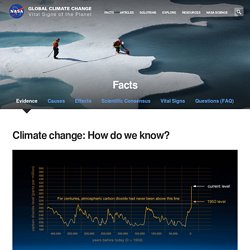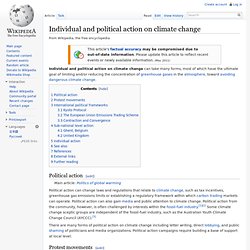

Klimareporter° Weltweiter CO2-Ausstoß bis 2017. Potsdam-Institut für Klimafolgenforschung. Welt steuert auf mindestens drei Grad zu – selbst mit umgesetztem Klimaschutz Kaum noch Chancen fürs Zwei-Grad-Ziel. Hat die Menschheit versagt?

Die Chance, die Erderwärmung bis 2100 auf zwei Grad oder weniger zu begrenzen, liegt nur noch bei rund fünf Prozent, wie Klimaforscher ermittelt haben. Selbst wenn man sofort alle CO2-Emissionen weltweit stoppen würde – was absolut unrealistisch wäre, steigen die Temperaturen bis 2100 in jedem Falle um 1,3 Grad. Das Klimaschutzziel von Paris ist daher nur noch mit drastischen, schnellen Maßnahmen zu erreichen, so die Forscher im Fachmagazin „Nature Climate Change“.
1912 Newspaper Article Anticipates Anthropogenic Global Warming. Claim: A 14 August 1912 article from a New Zealand newspaper contains a brief story about how burning coal might produce future warming by adding carbon dioxide to the atmosphere.

Origin:On 11 October 2016, the Facebook page “Sustainable Business Network NZ” posted a photograph of a clipping from the 14 August 1912 edition of the Rodney and Otamatea Times, Waitemata and Kaipara Gazette that included a brief item headlined “Coal Consumption Affecting Climate”: The furnaces of the world are now burning about 2,000,000,000 tons of coal a year. When this is burned, uniting with oxygen, it adds about 7,000,000,000 tons of carbon dioxide to the atmosphere yearly. Oil Investors at Brink of Losing Trillions of Dollars in Assets. Gore: It's That Road Runner Moment. Climate: Now or Never A major threat to fossil fuel companies has suddenly moved from the fringe to center stage with a dramatic announcement by Germany’s biggest power company and an intriguing letter from the Bank of England.

A growing minority of investors and regulators are probing the possibility that untapped deposits of oil, gas and coal -- valued at trillions of dollars globally -- could become stranded assets as governments adopt stricter climate change policies. The concept gaining traction from Wall Street to the City of London is simple. Limits on emissions of carbon dioxide will be necessary to hold temperature increases to 2 degrees Celsius, the maximum climate scientists say is advisable.
Without technologies to capture the waste gases from combusting fossil fuels, a majority of known oil, gas and coal deposits would have to stay underground. Steve Schneider's Global Warming Warning 30 years ago. The 1847 lecture that predicted human-induced climate change. When we think of the birth of the conservation movement in the 19th century, the names that usually spring to mind are the likes of John Muir and Henry David Thoreau, men who wrote about the need to protect wilderness areas in an age when the notion of mankind's "manifest destiny" was all the rage.

But a far less remembered American - a contemporary of Muir and Thoreau - can claim to be the person who first publicised the now largely unchallenged idea that humans can negatively influence the environment that supports them. George Perkins Marsh (1801-1882) certainly had a varied career. Here's how Clark University in Massachusetts, which has named an institute in his memory, describes him: Throughout his 80 years Marsh had many careers as a lawyer (though, by his own words, "an indifferent practitioner"), newspaper editor, sheep farmer, mill owner, lecturer, politician and diplomat. In other words, he kept himself busy. Evidence. The Earth's climate has changed throughout history.

Years of Living Dangerously Premiere Full Episode. RealClimate: Recent global warming trends: significant or paused or what? James Hansen (NASA): Why I must speak out about climate change. Storms of My Grandchildren: The Truth about the Coming Climate Catastrophe ... - James Hansen. Schlachtfeld Erde: Klimakriege im 21. Jahrhundert - Gwynne Dyer. Carbon Nation Full Movie Documentary] Catastrophic Climate Change & Runaway Global Warming - David Wasdell.
How to deal with denial. Tipping Points + Feedback Mechanisms. “Der geplünderte Planet” – Neuer Bericht an den Club of Rome in Berlin vorgestellt. Die Presseerklärung vom 06.

Juni 2013 finden Sie hier! Neuer Bericht an den Club of Rome: Allmähliche Erschöpfung kostengünstiger mineralischer Bodenressourcen stellt eine ernsthafte Bedrohung für die Zukunft des Wohlstands und des Wirtschaftssystems dar In dem Bericht “ Der geplünderte Planet – Die Zukunft des Menschen im Zeitalter schwindender Ressourcen ”, deckt der Autor, Ugo Bardi, das Thema des Raubbaus der Bodenschätze im großen Umfang ab. Wissenschaftsgeschichte des Klimawandels. Die Forschungsgeschichte des Klimawandels begann im frühen 19.

Jahrhundert mit der Feststellung der Eiszeiten und anderer natürlicher Veränderungen im Rahmen der Paläoklimatologie und der Entdeckung des natürlichen Treibhauseffekts im Jahr 1824. Individual and political action on climate change. Individual and political action on climate change can take many forms, most of which have the ultimate goal of limiting and/or reducing the concentration of greenhouse gases in the atmosphere, toward avoiding dangerous climate change.

Political action[edit] Political action can change laws and regulations that relate to climate change, such as tax incentives, greenhouse gas emissions limits or establishing a regulatory framework within which carbon trading markets can operate. Political action can also gain media and public attention to climate change. Political action from the community, however, is often challenged by interests within the fossil-fuel industry.[1][2] Some climate change sceptic groups are independent of the fossil-fuel industry, such as the Australian Youth Climate Change Council (AYCCC).[3]
The Compensators - Verschmutzungsrechte kaufen und löschen. Victory at Hand for the Climate Movement? There are signs the climate movement could be on the verge of a remarkable and surprising victory.

If we read the current context correctly, and if the movement can adjust its strategy to capture the opportunity presented, it could usher in the fastest and most dramatic economic transformation in history. This would include the removal of the oil, coal and gas industries from the economy in just a few decades and their replacement with new industries and, for the most part, entirely new companies. It would be the greatest transfer of wealth and power between industries and countries the world has ever seen. To understand this incredible potential we first have to step back and understand the unique structure of this social change movement, which may rank among the most influential in history.
It is simplistic to characterise it as an alliance of grass roots organisations and activists pitched against a rich and well connected adversary. To summarise: Dan Miller: Boom or Bust? Greg Dalton Gregory Dalton is chief operating officer at the Commonwealth Club of California and Director of The Club's Climate 1 Initiative.

He previously was international editor at The Industry Standard magazine, an editor for the Associated Press in New York, and a correspondent in China and Canada for the South China Morning Post, a Hong Kong newspaper. Proficient in both Mandarin and Cantonese, he is a former term member of the Council on Foreign Relations. Dan Miller. Lester Brown: The Planet's Scarcest Resource Is Time.
Running the Climate Experiment. Discovery Channel - Global Warming, What You Need To Know [Documentary] Reinhard Haase. HOME. HOME (FRANCAIS) Al Gore - An Inconvenient Truth. Al Gore: 400 PPM. Yesterday, for the first time in human history, concentrations of carbon dioxide, the primary global warming pollutant, hit 400 parts per million in our planet's atmosphere. This number is a reminder that for the last 150 years -- and especially over the last several decades -- we have been recklessly polluting the protective sheath of atmosphere that surrounds the Earth and protects the conditions that have fostered the flourishing of our civilization.
We are altering the composition of our atmosphere at an unprecedented rate. Indeed, every single day we pour an additional 90 million tons of global warming pollution into the sky as if it were an open sewer. As the distinguished climate scientist Jim Hansen has calculated, the accumulated manmade global warming pollution in the atmosphere now traps enough extra heat energy each day to equal the energy that would be released by 400,000 Hiroshima-scale atomic bombs exploding every single day. Explore the Shocking Effects of Climate Change on 6 Continents. Climate change isn't an issue for any one government or any one region. Carbon pollution has taken a devastating toll across the planet, from floods in Manila to droughts in Australia. To learn about the global reach of the environmental changes caused by human behavior, take a world tour with the six videos that premiered during Climate Reality Project's 24 Hours of Reality: The Cost of Carbon.
Mashable is proud to partner with the Climate Reality Project for its third annual 24 Hours of Reality. After joining Al Gore for a kick-off Hangout on Monday, we hosted Meetups on Tuesday, where our community came together to discuss changes we can make to reduce our individual carbon footprints. If you haven't tuned in yet, 24 Hours of Reality: The Cost of Carbon continues until 2 p.m. BROTHER EARTH (with Boots Riley and Josh Healey) Une Vérité qui dérange. Exclusive: Climate Hustle’s Marc Morano Turns Down $20k Global Warming Bets From Bill Nye The Science Guy. One of America’s most outspoken deniers of the link between fossil fuel burning and global warming has refused $20,000 in bets that the planet will keep getting hotter.
Offering the two bets to Marc Morano, of the conservative think tank the Committee for a Constructive Tomorrow (CFACT), is popular television science presenter Bill Nye, “the science guy”. CO₂ zählen ist kein Klimaschutz. Sonntag, 08. Mai 2016, 10:01 Uhr. Two degrees: Will we avoid dangerous climate change? 09 Dec 2014, 11:30Simon Evans Limiting warming to no more than two degrees has become the internationally accepted target for climate policy, as we saw in the first blog of our series of pieces looking at the two degrees limit. Scientists think the risks of climate change increase as temperatures rise. Two degrees isn't a 'safe' level of climate change, but nor is it a red line with only chaos beyond, as we'll see in part three. It is a readily understood and useful marker of how we're doing at limiting dangerous climate change that has helped focus minds on the scale of the challenge.
It's also what the world's governments have committed to achieving. So will we manage to limit warming to two degrees above pre-industrial? 1. The world has already warmed by 0.85 degrees celsius above the pre-industrial average and if emissions stay high we're on course for more like three to five degrees by 2100,according to the latest Intergovernmental Panel on Climate Change (IPCC) reports.
Two degrees? Sounds nice. The reality will be rather different. If we continue to emit ever-greater quantities of CO2 and other greenhouse gases into the atmosphere, then average global temperatures will rise by 2°C over the next three decades compared to pre-industrial times. Most scientists agree that anything higher is dangerous, though many argue that even this is too much. As the battles to reach an agreement in Paris begin, and with so much at stake, it is perhaps curious that few people really understand what a 2°C rise in average temperatures will mean.
When our climate changes so much from day to day, an increase of this seemingly small magnitude appears almost trivial. But it is not. Jeremy Jackson: Sea Level Rise is Dangerous. Which fossil fuel companies are most responsible for climate change? – interactive. Turn autoplay off Edition: <span><a href=" Beta About us Today's paper Subscribe This site uses cookies.
Custom Search Which fossil fuel companies are most responsible for climate change? Zementindustrie verursacht sechs Prozent. Dienstag, 26. About. CO2 emissions from the cement industry constitute 5% (or 1.9 Gt annually) of global anthropogenic CO2 emissions[1]. In 2013, approximately 20% of global CO2 emissions from cement production originated from Europe (EU28)[2]. Given the ambitious energy and climate targets that the EU has proposed and agreed on (40% emissions reduction by 2030[3], 80-95% emissions reduction by 2050), CO2 emissions from energy-intensive industries will need to be eliminated or significantly reduced. Movie Review: There’s a Vast Cowspiracy about Climate Change.
Movie night at my house last weekend, featuring Cowspiracy. The name says it all. The 2014/2015 movie by that name—“The Film That Environmental Organizations Don’t Want You to See,” according to its website—has uncovered an immense conspiracy between governments and the world’s biggest environmental organizations, to deceive the public about the principal cause of global warming. But the film’s premise is based on badly flawed—and almost unanimously rejected—interpretations of science. Let me explain… According to Cowspiracy, the major source of global warming pollution isn’t fossil fuels like coal, oil, and natural gas, as the world’s scientists are telling us.
Cows worse than fossil fuels? Central to Cowspiracy’s conspiracy theory is the supposed “fact” that a 2009 study found that 51% of all greenhouse gases are produced by animal agriculture. Documentary Our Worst-Case Scenario Earth 2100: What will happen ? english/portuguese subtitles.
Kohlendioxid-Sauger fürs Klima: CO2-Filter effizienter als gedacht. Die Isländer sitzen auf einer Ressource, die am wertvollsten ist, wenn sie einfach da bleibt, wo sie ist, Hunderte Meter unter der Erde. Dann könnte das Basaltgestein Kohlendioxid binden, das einst aus dem Boden geholt, verbrannt wurde und in der Atmosphäre seine klimaschädliche Wirkung entfaltet hat. Das zumindest ist die Idee hinter „Orca“. Orca ist eine Pilotanlage der Direct-Air-Capture-Technologie, kurz DAC, die im Klimaschutz zwar noch keine Rolle spielt, in zwanzig, dreißig Jahren aber zu einem wichtigen Baustein werden könnte. Denn auch wenn fossile Brennstoffe in Zukunft im Boden verbleiben, ist die Atmosphäre noch immer mit historischem Ballast aus der Zeit gefüllt, als das anders war. Golem.de: IT-News für Profis. Cookies werden von Golem.de oder Dritten eingesetzt zur Analyse der Seitennutzung, zur Personalisierung von angezeigtem Inhalt und Anzeigen, sowie der Messung ihrer Performance.